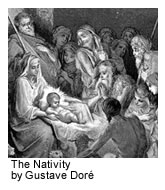by David W. Loy

The shooting in the Great Christmas Wars is well underway—again. Store after store tells its sales clerks to chirp Happy Holidays rather than Merry Christmas, while conservative Christian organizations mobilize the troops for a frontal assault on this change from the traditional greeting of the season.
Time was when the Christmas wars were fought mostly on the turf of county courthouses, city parks, and school halls. In the past few years, the fighting also has invaded the checkout lines at countless retailers across the nation.
Christians have mobilized for the fight, ready to defend the holiday to the death. Ted Olsen of Christianity Today tells of standing in a grocery store and hearing a clerk wish a customer “Happy Holidays.” The customer shot the poor clerk a deadly look and then wished her “Merry Christmas” in a tone that was anything but merry (Christianity Today, December 2007, p. 18). The war is on.
The question is this: Who’s defending what and why? The other question: Do Christians need to fight this war at all?
Nothing New
A familiar Old Testament passage answers both questions. The Great Christmas Wars are not a new phenomenon, and they are not just an American phenomenon. Right smack dab in the middle of the Old Testament we see another episode in the Great Christmas Wars. It turns out, how you feel about Christmas has a lot to do with how you feel about Christ, and how you feel about Christ has a lot to do with whether you believe He is God-with-us. For those without faith, the promise of God-with-us is an alarming threat, but those with faith find great hope in the promise that “the virgin will be with child and will give birth to a son, and will call Him Immanuel” (Is. 7:14 NIV).
This well-known passage from Isaiah is part of a larger story. It tells about Ahaz, king of Judah, a descendant of King David. During his reign, the geopolitical realities confronting Judah were harsh. The Assyrian Empire to the north and east had its eyes on Egypt, which lay south and west of Judah. Now, to get from north and east to south and west, you had to go through—guess what—Judah.
Of course, you also had to go through Israel (that is, the Northern Kingdom—the 10 tribes) and Syria, both of which were angling to hold off Assyria. And the timing was right. Assyria was dealing with political problems elsewhere and couldn’t devote its military attention to these little fish. So Israel and Syria decided they would move into Judah, remove King Ahaz, who sat on the throne of David, and put in their own man as king. Then they could hold off Assyria—or so they thought:
“Now the house of David was told, ‘Aram has allied itself with Ephraim [that is, the Kingdom of Israel]’; so the hearts of Ahaz and his people were shaken, as the trees of the forest are shaken by the wind” (Is. 7:2).
Now there’s already a problem here. God had long before promised the people of Judah and Israel that He would protect them from all their earthly enemies if they would obey the covenant He made with them at Mount Sinai. Yet here stands King Ahaz, shaking like the branches of a wind-blown tree. Why? Because he trusted neither God nor God’s promises. His approach to the world was all about power and politics. He had no room for a God who promised to protect His people. It was too impractical.
It was too inconvenient, because it meant giving up power and giving up sin. So Ahaz did the only thing he could think to do:
“Ahaz sent messengers to say to Tiglath-pileser king of Assyria, ‘I am your servant and vassal. Come up and save me out of the hand of the king of Aram and of the king of Israel, who are attacking me.’ And Ahaz took the silver and gold found in the temple of the Lord and in the treasuries of the royal palace and sent it as a gift to the king of Assyria” (2 Kings 16:7–8).
In fact, Ahaz actually traveled to Assyria, and when he came back, he put an Assyrian altar to an Assyrian god in the Lord’s temple. He sold out to the geopolitical realities because he did not trust God the Lord to keep His promises.
Enter Isaiah
 That is roughly where Isaiah enters the picture. In the middle of the crisis, Isaiah arrives with God’s promise to rescue the people of Judah. Ahaz wouldn’t listen. So “the Lord spoke to Ahaz, ‘Ask the Lord your God for a sign’” (Is. 7:10). Ahaz played all pious and said, “I would never test the Lord by asking for a sign, because the Lord forbids it.”
That is roughly where Isaiah enters the picture. In the middle of the crisis, Isaiah arrives with God’s promise to rescue the people of Judah. Ahaz wouldn’t listen. So “the Lord spoke to Ahaz, ‘Ask the Lord your God for a sign’” (Is. 7:10). Ahaz played all pious and said, “I would never test the Lord by asking for a sign, because the Lord forbids it.”
Those are nice sentiments, but when the Lord told Ahaz to ask for a sign, and he pretended his piety wouldn’t allow it, he was just disobeying God. He was acknowledging that getting a sign from God would be too inconvenient. It would expose his sin and his unbelief. Well, God exposes his sin and unbelief anyway. “Therefore the Lord Himself will give you a sign: The virgin will be with child and will give birth to a son, and will call Him Immanuel.”
There’s the sign. A virgin gives birth to a son.
What kind of sign is this? That depends. For Ahaz, it’s a sign of God’s wrath. It’s a sign that God is fed up with Ahaz and his lack of faith. Ahaz has asked the Assyrians for help, so God is going to give Ahaz what he asked for: The Assyrians will come. But this is not going to be a pleasant partnership with Papa Pileser, kind king of the Assyrians. This is going to be heartache and suffering, poverty and punishment.
For those who do not believe, Immanuel, God-with-us, means God has come to punish the children for the sin of the fathers to the third and fourth generation of those who hate Him (Ex. 34:7). For those who want to rule themselves and their own lives, Immanuel, God-withus, means God is coming to strike them down for rebelling against Him, King Most High. But for those who trust God, Immanuel, God-with-us, means that God will come to rescue them and be their Shepherd and their King, so that they no longer have to suffer under their own sin and the sin of arrogant, self-serving, faithless kings like Ahaz.
Which brings us back from the Great Christmas War of King Ahaz, which Ahaz lost and God won, to the Great Christmas Wars of our own day. Who’s defending what, and why?
A Question of Faith
 Let’s start with those who have waged war against Christmas in our culture. Why do they get so hot about the issue? It really comes down to the question of faith. Those who do not believe in Jesus Christ cannot and will not submit to His rule and reign as God in this world. The message of Jesus Christ is “a stumbling block to Jews and foolishness to Gentiles” (1 Cor. 1:23).
Let’s start with those who have waged war against Christmas in our culture. Why do they get so hot about the issue? It really comes down to the question of faith. Those who do not believe in Jesus Christ cannot and will not submit to His rule and reign as God in this world. The message of Jesus Christ is “a stumbling block to Jews and foolishness to Gentiles” (1 Cor. 1:23).
Naturally, the unbelievers in our world are fighting against Christmas. They do not believe in our Savior, and so the preaching of Christmas challenges them, as it challenged Ahaz. The old, sinful human being wants to be king in his world. He wants to make the laws that he follows; he wants to decide for himself whether he has done right or wrong; and he wants to judge for himself what penalties he should pay, if any, for any supposed wrongdoings. If the message of Christmas is that a virgin has conceived and borne a Son, and His name is Immanuel, that is, God-is-with-us, then it means there is a higher authority in the world.
It means God has come and is laying claim to our lives and telling us what we should and should not do. It means He is telling us whether we have done right or wrong, and He is telling us what the just penalty is, namely, eternity in hell. If Christmas is really about the birth of God into our human flesh and blood, then there are only two responses: to turn away from sin and bow down and worship the newborn King, or to reject God’s law and live how we want to and run away from the newborn King.
So, do Christians need to fight this war? Well, yes and no. Yes, we need to fight this Great Christmas War in the way that Ahaz should have. We need to fight the sin in our own hearts. We need to repent and turn away from sin and turn our lives over to Him who was born into our human flesh and blood to redeem us from sin. The Great Christmas Wars are fought first and foremost on the turf of our heart, where the giving, forgiving Christ Child works with the Holy Spirit to create saving faith. The Christ Child came and lived a life of perfect faith and obedience, because we do not and could not. He was born under the death sentence that we deserve as rebels against God, and He died under that death sentence in order to clear your name and mine and Ahaz’s—and the name of every corporate executive and lawyer and politician who tries to remove the name of Jesus from public life.
Remember, the Great Christmas Wars are fought first in your heart, not in someone else’s, and apart from the grace of our Lord Jesus Christ, we also would be just like Ahaz and just like those who wage war against Christmas in our own day and age. “There is no difference, for all have sinned and fall short of the glory of God, and are justified freely by His grace through the redemption that came by Christ Jesus” (Rom. 3:22–24). If Christians are on God’s side in this war, it is only because God Himself came into this world and picked us up by the collar and hauled us out of enemy territory and gave us new hearts and new minds. We can’t claim any credit, because “when the kindness and love of God our Savior appeared, He saved us, not because of righteous things we had done, but because of His mercy” (Titus 3:4–5).
Our Hope
And that brings us to the hope we have through faith in this wonderful promise that “the virgin will be with child and will give birth to a son, and will call Him Immanuel.” God in Christ came to earth to wage this war Himself, because we were hopelessly lost and fighting for the enemy. Now that He has rescued and redeemed us, He is still Immanuel, God-with-us, even “to the very end of the age” (Matt. 28:20). We don’t need to fight the Great Christmas Wars on Christ’s behalf. He’s still here, and He is fighting these wars for us, and He’s quite capable of winning them Himself.
In fact, He has promised that the gates of hell will not prevail against His church (Matt. 16:18). No one is going to take Christ out of Christmas, because no one can remove our King from His throne. The Great Christmas Wars are already won. God saw to that when the virgin conceived and gave birth to a son, who is God-with-us. So if your neighbor or the cashier wishes you “Happy Holidays,” don’t pull out your petitions and boycotts. Instead, take the opportunity to share the good news of Immanuel, God-with-us. Reply with a joyful “Merry Christmas” or say, “I’m celebrating the birth of Christ.”
And do it with a happy heart and a genuine smile.





